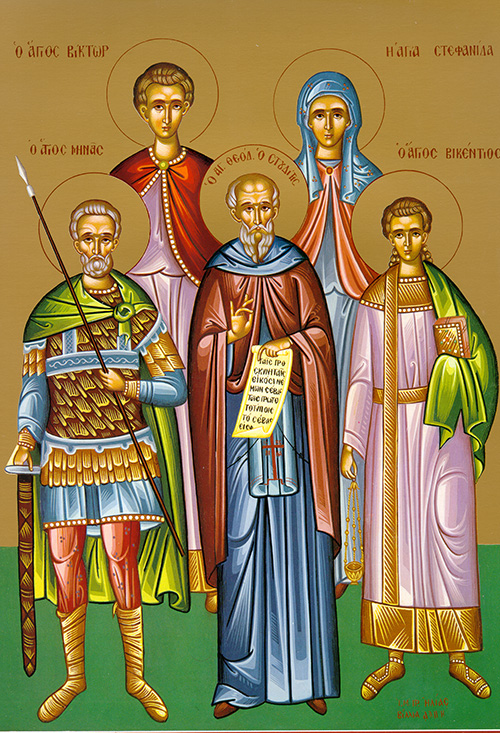

The holy martyr Menas was a soldier from Egypt. When ordered to worship pagan idols and arrest and persecute Christians, St. Menas refused and left the army to go into the wilderness and live an ascetic life. At the age of fifty, St. Menas had a vision that he regarded as a sign to follow the path to martyrdom. He sought out a pagan festival and disrupted it, confessing the One True God, and our Lord Jesus Christ. He was arrested, tortured, and eventually beheaded in 304. His relics were gathered and hidden until the persecution was over. They were brought to Egypt and placed in a church dedicated to the saint where they continue to work miracles for those who entreat him with faith and love.
The holy martyr Victor was a soldier, during the reign of the emperor Marcus Aurelius the Philosopher (161-180). He was tortured, but he came through all the torments unharmed. Through St. Victor’s prayers, blind soldiers suddenly received their sight. The torturer ordered that the holy Martyr Victor be beheaded. Hearing the commander’s order, St. Victor told his executioners that they would all die in 12 days, and that the commander would be captured by the enemy in 24 days. As he foretold, so it came to pass.
The holy martyr Vincent was a deacon ordained by Bishop Valerian of Augustopolis (now Saragossa, Spain). He was an eloquent orator, and preached in church and among the people. St. Vincent was arrested with his bishop during the persecution under the emperor Diolcatian. The holy deacon underwent many torments, but came through all of them, and exhausted his torturers. After the tortures they threw the martyr back into prison. That night the astonished guard heard him singing Psalms, and saw an unearthly radiant light in the prison. The next morning the holy martyr was condemned to be burned on a gridiron. Christians took the saint’s body and buried it with reverence. This occurred in the year 304.
The holy martyr Stephanis was the young Christian wife of one of the tortures of the holy martyr Vincent. After she witnessed the miracles worked by the Lord through St. Vincent, Stephanis openly glorified Christ, for which she was condemned to a cruel death. She was 15 years old.
Our venerable father and confessor Theodore the Studite was hegumen of that monastery in Constantinople who suffered greatly for his defense of the cult of the holy icons. He was a wise organizer of monastic life, an inspired teacher of the Orthodox faith, and a great ascetic. He died in Constantinople in the year 826 and the age of 68.
O Lord, You have made those martyrs who shared in Your passion ornaments of glory for the world. Therefore, we have in them an invincible advocate.
Guide to Orthodoxy, teacher of piety and holiness, luminary of the world, inspired adornment of monks, O wise Theodore, harp of the Spirit, you enlightened all by your teachings; intercede with Christ our God to save our souls.
Christ our God summoned you from an earthly army, and enlisted you in the army of heaven, O martyr Menas. You have been given the untarnishing crown of the martyrs.
You surrounded yourself with every ascetic practice in order to protect your angelic life. With the grace of God you became like the angels. Together with them, O Theodore, never cease to intercede with Christ our God for the sake of all of us.
1 Thessalonians 1: 6-10
Brothers and sisters: You became imitators of us and of the Lord, receiving the word despite great trials, with the joy that comes from the Holy Spirit. Thus you became a model for all the believers of Macedonia and Achaia. The word of the Lord has echoed forth from you resoundingly. This is true not only in Macedonia and Achaia; throughout every region your faith in God is celebrated, which makes it needless for us to say anything more. The people of those parts are reporting what kind of reception we had from you, and how you turned to God from idols, to serve him who is the living and true God and to await from heaven the Son he raised from the dead – Jesus, who delivers us from the wrath to come.
Luke 12: 42-48
The Lord said, “Who in your opinion is that faithful, farsighted steward whom the master will set over his servants to dispense their ration of grain in season? That servant is fortunate whom his master finds busy when he returns. Assuredly, his master will put him in charge of all his property. But if the servant says to himself, ‘My master is taking his time about coming,’ and begins to abuse the housemen and servant girls, to eat and drink and get drunk, that servant’s master will come back on a day when he does not expect him, at a time he does not know. The master will punish him severely and rank him among those undeserving of trust. The slave who knew his master’s wishes but did not prepare to fulfill them will get a severe beating, whereas the one who did not know them and who nonetheless deserved to be flogged will get off with fewer stripes. When much has been given a man, much will be required of him. More will be asked of a man whom more has been entrusted.”
Icon courtesy of Jack Figel, Eastern Christian Publications – ecpubs.com
Monday, November 10 –